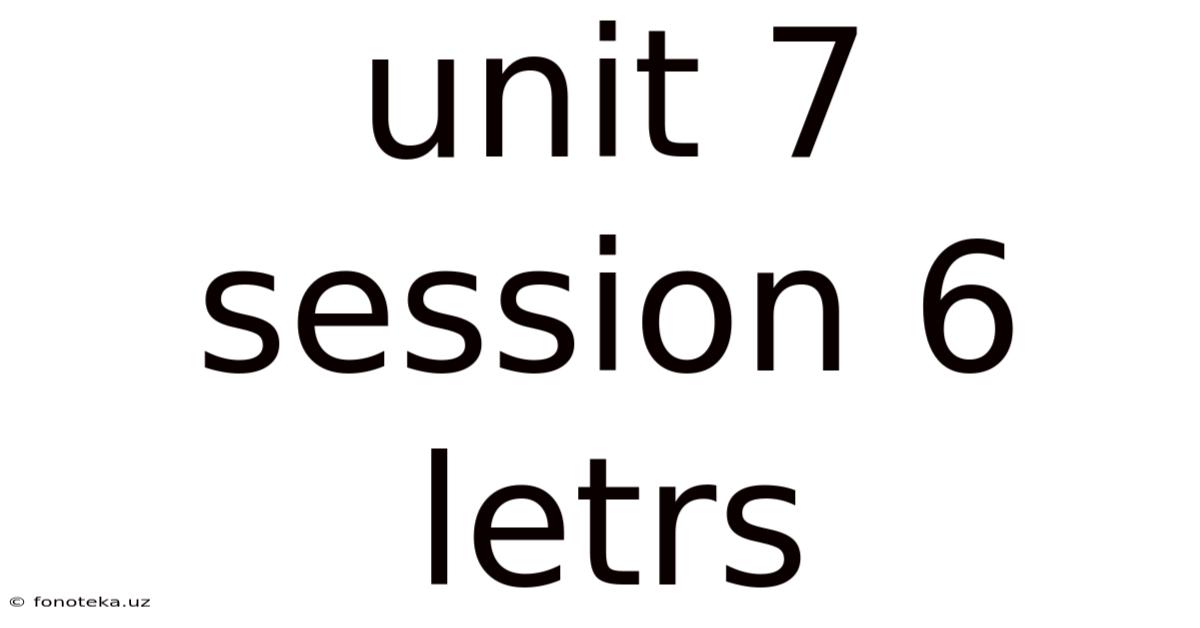Unit 7 Session 6 Letrs
fonoteka
Sep 20, 2025 · 4 min read

Table of Contents
I cannot find any publicly available information about a specific educational curriculum or program called "Unit 7 Session 6 LETRS." LETRS (Language Essentials for Teachers of Reading and Spelling) is a well-known professional development program for educators focused on reading instruction, but there's no standard numbering system like "Unit 7 Session 6" that applies universally. The content of such a session would be highly specific to the particular LETRS course version and institution offering it.
Therefore, I cannot write a complete article about "Unit 7 Session 6 LETRS" because the content is unknown and likely proprietary. However, I can provide you with a comprehensive overview of key concepts commonly covered within LETRS programs, which might help you understand the potential content of such a session. This will be organized in a way that allows you to search for specific topics within the broader LETRS framework if you have more details about the session you're interested in.
Understanding the Core Principles of LETRS
LETRS is based on a robust scientific understanding of reading and spelling acquisition. Its core principles address the multifaceted nature of reading, encompassing phonological awareness, phonics, fluency, vocabulary, and comprehension. A "Unit 7 Session 6" would likely delve deeper into one or more of these areas. Let's examine each in detail:
1. Phonological Awareness
This is the foundation of reading. It involves the ability to hear and manipulate the sounds of spoken language. Key aspects include:
- Rhyming: Identifying words that sound alike.
- Syllable Segmentation: Breaking words into syllables.
- Onset-Rime Blending and Segmentation: Identifying the beginning sound (onset) and the rest of the word (rime).
- Phoneme Blending and Segmentation: Identifying and manipulating individual sounds (phonemes) within words.
A LETRS session might focus on specific strategies for assessing and teaching phonological awareness, perhaps focusing on advanced skills like manipulating multisyllabic words or identifying complex consonant blends.
2. Phonics
Phonics teaches the relationship between letters and sounds. This involves understanding:
- Grapheme-Phoneme Correspondences: Matching letters or letter combinations (graphemes) to their corresponding sounds (phonemes).
- Decoding: Using grapheme-phoneme knowledge to sound out unfamiliar words.
- Encoding: Spelling words by applying grapheme-phoneme knowledge.
- Consonant and Vowel Sounds: Understanding the different sounds produced by various consonants and vowels, including digraphs (e.g., sh, ch) and diphthongs (e.g., oi, ou).
A "Unit 7 Session 6" might concentrate on advanced phonics patterns like vowel teams, silent letters, or the complexities of r-controlled vowels. It could also cover strategies for addressing common phonics challenges students face.
3. Fluency
Fluency refers to the ability to read accurately, quickly, and with expression. This is crucial because it frees up cognitive resources for comprehension. LETRS likely addresses:
- Accuracy: Reading words correctly.
- Rate: Reading at an appropriate speed.
- Prosody: Reading with expression, including intonation, phrasing, and pacing.
A session might focus on specific fluency interventions, such as repeated readings, choral reading, or partner reading. It might also explore the connection between fluency and comprehension.
4. Vocabulary
Vocabulary refers to the knowledge of words and their meanings. Strong vocabulary is vital for comprehension. LETRS would cover:
- Tiered Vocabulary: Understanding the different levels of vocabulary (basic, high-frequency, academic, specialized).
- Vocabulary Acquisition Strategies: Learning how to learn new words, including context clues, dictionaries, and word parts.
- Vocabulary Instruction: Effective methods for teaching vocabulary to students.
A hypothetical session might focus on specific vocabulary-building strategies or address the role of morphology (word parts) in vocabulary acquisition.
5. Comprehension
Comprehension is the ultimate goal of reading. It involves understanding the meaning of text. LETRS emphasizes:
- Literal Comprehension: Understanding the explicit information in the text.
- Inferential Comprehension: Making inferences and drawing conclusions based on the text.
- Critical Comprehension: Evaluating the text and forming opinions.
- Metacognitive Strategies: Using strategies to monitor and regulate comprehension.
A later session in a LETRS program could delve into advanced comprehension strategies such as comparing and contrasting characters, analyzing the author's purpose, or identifying bias in texts. It might also explore how to effectively question students to improve comprehension.
Addressing Potential "Unit 7 Session 6" Topics
Given the likely focus of a hypothetical "Unit 7 Session 6" within the broader LETRS framework, it might deal with one of these advanced aspects:
- Multisyllabic Word Reading: Strategies for decoding and reading words with multiple syllables, including syllable division and accent patterns.
- Advanced Phonics Patterns: A deeper dive into less common phonics rules and exceptions.
- Morphology and Vocabulary Acquisition: How understanding word parts (prefixes, suffixes, roots) enhances vocabulary knowledge.
- Reading Fluency Interventions for Older Struggling Readers: Addressing fluency challenges in older students who may have fallen behind.
- Advanced Comprehension Strategies: Strategies for critical analysis, text evaluation, and inference in more complex texts.
- Differentiation and Assessment: Adapting instruction to meet the diverse needs of students and using formative and summative assessments to monitor progress.
Without knowing the specific curriculum materials used, I can only speculate on the exact content. If you have access to the curriculum or syllabus for your specific LETRS program, refer to that document for accurate information about "Unit 7 Session 6." This detailed overview of LETRS principles should provide a framework for understanding what the session might cover.
Latest Posts
Latest Posts
-
An Investigator Wants To Understand
Sep 20, 2025
-
Algebra 1 Unit 1 Test
Sep 20, 2025
-
Sample Hesi Exit Exam Questions
Sep 20, 2025
-
Cual Es Uno De Los
Sep 20, 2025
-
11 7 4 How The Internet Works
Sep 20, 2025
Related Post
Thank you for visiting our website which covers about Unit 7 Session 6 Letrs . We hope the information provided has been useful to you. Feel free to contact us if you have any questions or need further assistance. See you next time and don't miss to bookmark.